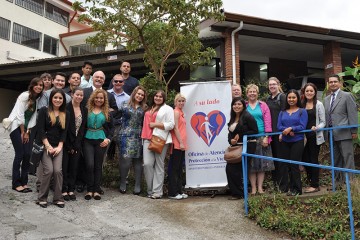
This summer, professors from various departments put their passions into action. From a traditional Nigerian wedding and international visits to the Big Apple, some Fresno State professors made this summer one to remember.
Dr. Samuel Omolayo, a geography professor, traveled overseas this summer for a special reason. In June, Omolayo went to Nigeria with his family to participate in his daughter’s traditional Nigerian wedding ceremony.
A long process, Omolayo said Nigerian engagements sometimes last years. Because of his work at Fresno State, Omolayo said his family was only able to spend three days in Nigeria.
The day of the engagement was filled with tradition, he said: gifts for the bride from the groom’s family and food for almost 1,000 guests prepared by families of the bride and groom.
“We slaughter cows,” Omolayo said. “Invitation is not limited; as many people from the groom’s side and his friends, and the bride’s side, and so you have to have a big hall somewhere.
“There’s dancing with traditional drum and, you know, everything is involved there.”
Along with praying for the new couple, Omolayo said a tradition is to shower money on the guests as they dance and celebrate the marriage.
“It’s a kind of joy,” Omolayo said. “To that culture, that is a way of just celebrating your daughter, and that you are happy that something good is happening.”
His daughter had a Christian ceremony the next day, but his faith was tested even before they arrived.
“When we sent home that we’re coming home for the wedding June 5 and June 6, they said, ‘But that is rainy season. You people don’t do that!’” Omolayo said. “I said, ‘Don’t worry, God gave us the dates.”
“So we went by faith, and those three days, the 5th, 6th, and Sunday the 7th, God held the heavens. No rain. We never had to stop for any rain. So that was our testimony of God’s grace.”
Over the past few summers, rain or shine, professors from Fresno State’s Department of History honed their skills, meeting with more than 50 history teachers from nearby districts to teach seminars and deliver lectures on historical topics through a large “Teaching American History” grant.
Dr. Michelle DenBeste, a Fresno State history professor and department chair, said she participated in the seminars and lectures, along with nearly all of the history department’s faculty members.
DenBeste said the seminars are followed by trips to a different historical location each year.
“We went to the South and did a civil rights tour. We went to Philadelphia, to Boston, to Charleston and Chicago,” DenBeste said.
For this year’s trip, DenBeste said the professors traveled to New York for one week and spent time touring the city’s landmarks.
“The Tenement Museum provided us with a half-day pedagogy seminar,” DenBeste said. “We toured the museum, went on a walking tour of the area and discussed pedagogical strategies.
“We also went out to visit the Roosevelt Home in Hyde Park, where in addition to the tour, they provided us with teaching materials and teaching strategies.”
The grant allowed DenBeste to do more than travel. She said the experience allowed her to get to know the teachers she works with.
This grant has allowed us to get to know the teachers as people, but also to get to know what they do, the struggles they have in the classroom and what they do each day,” DenBeste said.
Along with trips to enhance their own teaching skills, some Fresno State professors planned educational trips for their students.
Dr. Robert McDonald, a criminology professor, compromised half of the team that took a group of 18 criminology students, including graduate students and students in the global studies program, to San Jose, Costa Rica for six days.
He said the department takes the “Administration of Justice and Culture” trip once or sometimes twice a year to give students a better understanding of the criminal justice system in different cultures.
“It shows them how other countries operate in comparison to the United States,” McDonald said. “It also shows things that we might improve upon as future criminal justice practitioners, the students, and also things that they might offer to the countries that we go to that they can improve.”
On the trip, McDonald said the group visited three prisons, a government victims program, the largest police agency in Costa Rica and its U.S. Embassy.
“It showed these students what they could do on a global basis; being a foreign affairs officer for the U.S. government in a foreign land,” McDonald said.
It’s an experience McDonald said he knows the students cherish.
“We have them write an essay after they come back, and without exception every one of them talked about how they never would have seen and learned what they saw and learned if they had not gone on the trip,” McDonald said. “That’s my motivation right there””just to do it for the students.”




